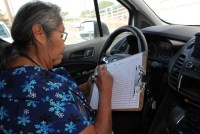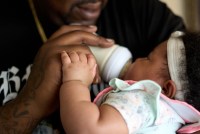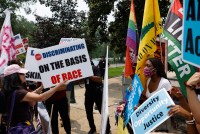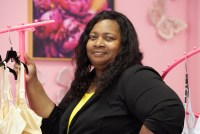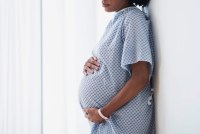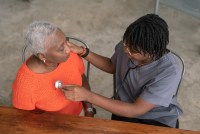Latest Morning Briefing Stories
Doctors Advocate Fresh Efforts to Combat Chagas Disease, a Silent Killer
Chagas disease, caused by a parasite, affects people primarily in rural Latin America. But an estimated 300,000 residents of the U.S. have the disease, which can cause serious heart problems. Patient advocates call for much more aggressive efforts to fight it.
Médicos abogan por nuevos esfuerzos para combatir al Chagas, un asesino silencioso
La enfermedad de Chagas, causada por un parásito, afecta principalmente a personas en las zonas rurales de Latinoamérica. Pero se estima que 300,000 personas en Estados Unidos viven con la enfermedad, que puede causar problemas cardíacos graves. Defensores de pacientes piden esfuerzos mucho más agresivos para combatirla.
Tribal Health Workers Aren’t Paid Like Their Peers. See Why Nevada Changed That.
Community health workers, who often help patients get to their appointments and pick up prescriptions for them, have increasingly been recognized as an integral part of treating chronic illnesses. But state-run Medicaid programs don’t always reimburse them equally, usually excluding those who work on tribal lands.
Seeking Medicare Coverage for Weight Loss Drugs, Pharma Giant Courts Black Influencers
Novo Nordisk, the dominant company in the multibillion-dollar market for weight loss drugs, focuses on Black lawmakers and opinion leaders to spread the message that obesity is a chronic disease that needs treatment.
Amid Lack of Accountability for Bias in Maternity Care, a California Family Seeks Justice
April Valentine’s family wants to know whether racism could have played a role in her death. A KFF Health News analysis shows state regulators are ill-equipped to find discrimination in its many forms.
Mujeres negras sopesan riesgos emergentes de alisadores para el cabello “adictivos”
Los alisadores pueden contener carcinógenos, como agentes liberadores de formaldehído, ftalatos y otros compuestos que alteran el sistema endócrino, según estudios de los Institutos Nacionales de Salud.
Black Women Weigh Emerging Risks of ‘Creamy Crack’ Hair Straighteners
Social and economic pressures have long compelled Black girls and women to straighten their hair. But mounting evidence shows chemical straighteners — products with little regulatory oversight — may pose cancer and other health risks.
Meet the People Deciding How to Spend $50 Billion in Opioid Settlement Cash
As settlement dollars land at the state level, state councils wield significant power in determining how the windfall gets spent. And, though they will likely include the most knowledgeable voices on addiction, these panels also face concerns about conflicts of interest and other issues.
Idaho Drops Panel Investigating Pregnancy-Related Deaths as US Maternal Mortality Surges
Amid a years-long rise in maternal mortality rates in the United States, Idaho lawmakers decided to disband a committee created to investigate pregnancy-related deaths.
Cómo puede afectar a la atención médica el fallo de acción afirmativa de la Corte Suprema
La decisión dijo que es inconstitucional que los colegios y universidades usen la raza como un factor en la admisión de estudiantes.
How Health Care May Be Affected by the High Court’s Affirmative Action Ruling
Some medical professionals warn that the Supreme Court’s recent ruling against using race as a factor in admissions could have far-reaching implications for the diversity of medical students, the practice of medicine, and patient care. Here’s what you need to know.
New Charleston Museum Nods to Historical Roots of US Health Disparities
The $120 million International African American Museum that opened this week in Charleston, South Carolina, allows visitors to step back in history at Gadsden’s Wharf, where tens of thousands of enslaved Africans arrived in America, the genesis of generations of health disparities.
‘We’re Not Doing That’: Why a Black Couple Wouldn’t Crowdfund to Pay Off Medical Debts
Kristie Fields, a cancer patient in Virginia, was urged to go public to seek financial help. She worried about feeding hurtful stereotypes.
Advocates Call for 911 Changes. Police Have Mixed Feelings.
Though most California counties are experimenting with dispatching health professionals rather than law enforcement to respond to people experiencing mental health crises, powerful police unions fear defunding.
Black, Rural Southern Women at Gravest Risk From Pregnancy Miss Out on Maternal Health Aid
A federal program meant to reduce maternal and infant mortality in rural areas isn’t reaching Black women who are most likely to die from pregnancy-related causes.
Escasez crónica de salvavidas resalta desigualdades raciales
Cuando las autoridades locales toman decisiones sobre el cierre de piscinas o la reducción de horarios, lo hacen sabiendo que la natación tiene un tenso historial de desigualdades raciales.
Chronic Lifeguard Shortage Serves as Springboard to Address Racial Inequities
Cities and towns are again in deep waters this summer trying to hire enough lifeguards to open their public pools. Many are proceeding with sensitivity to issues of race and ethnicity.
Cardiovascular Disease Is Primed to Kill More Older Adults, Especially Blacks and Hispanics
Cardiovascular disease is the biggest killer of older Americans, with Black and Hispanic people at higher risk. Despite medical advances, researchers say, disparities are expected to worsen in the coming decades.
Mammograms at 40? Breast Cancer Screening Guidelines Spark Fresh Debate
There is no direct evidence that screening women in their 40s will save lives, yet modeling suggests expanding routine mammography to include them might avert 1.3 deaths per 1,000. Highlighting the risk of false positives, some specialists call for a more personalized approach.
La enfermedad cardiovascular podría matar a más adultos mayores hispanos
El dramático envejecimiento de la población de Estados Unidos y el número creciente de personas con afecciones como hipertensión, diabetes y obesidad —que aumentan el riesgo cardíaco— se espera que contribuyan a este escenario alarmante.




